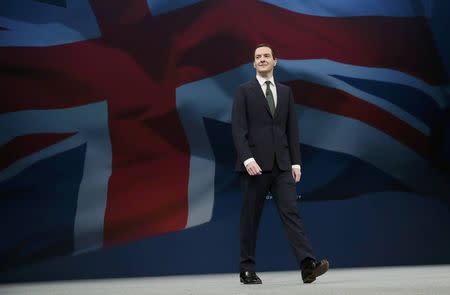Osborne poaches policy with eye on leadership
By Elizabeth Piper and William James MANCHESTER, England (Reuters) - Chancellor George Osborne will launch a plan on Monday to spur infrastructure investment in Britain, seeking to counter a push by the left-wing opposition and stake the government's claim to the centre ground. His adoption of a policy promoted by his Labour Party opponents fuels expectations that Osborne is moving towards the centre to buttress his credentials to succeed Prime Minister David Cameron, who has said he will step down by 2020. At the annual conference of the ruling Conservative Party, Osborne will say the government will invest 5 billion pounds ($7.6 billion) by 2020 and pool local government pension pots into six wealth funds worth 25 billion pounds each to invest in vital infrastructure. He will also announce what party members hail as a "coup", the recruitment of former Labour cabinet minister Andrew Adonis, a policy chief for Tony Blair, to chair an independent commission to decide where best to put those funds. Alongside incentives for grandparents to help with childcare, Osborne's new policies appear designed to address criticism over his austerity drive, and strike at the heart of Labour's attempts to rally support for its new far-left leader. Criticising the "decades" it takes to get agreement to move ahead with infrastructure projects such as high-speed railways in Britain, Osborne told BBC radio: "I want to change all that. I am trying to shake the inertia of this country and say: "Look, we have got to plan and build for the future." He said the new commission headed by Adonis, a former transport secretary, would give the "calm and expert" advice on what to build to provide jobs for working people. "I'm not prepared to turn round to my children - or indeed anyone else's child - and say: I'm sorry, we didn't build for you," he will tell the party conference in the northern city of Manchester. His pitch to position the ruling Conservatives as a party for working people as well as the wealthy is seen as part of his push to secure succession when Cameron steps down. HIP HOP FAN At the weekend, he offered some insights into his personal life in an interview with the right-wing newspaper, the Daily Mail - in what has become almost a rite of passage for future political leaders. He said he married the woman he had once tried to set up with his friend, had been told by his 12 year-old daughter that he could not go to pop concerts with her and said he is a fan of hip-hop group, N.W.A. Silent on his upper-class upbringing, he also said he should be sacked if he showed disloyalty to Cameron by lobbying for the leadership prematurely. But pressed on what would happen when that contest arrives, he said: "Let's ... see how it flies." In a poll of Conservative Party members conducted by the ConservativeHome website on Monday, 32 percent backed Osborne as the new party leader. Next placed was business secretary, Sajid Javid, on 17 percent. Labour's new far-left leader, Jeremy Corbyn, who had made one of his main arguments the need to spur investment in infrastructure and housing in Britain, criticised Osborne for making promises he could not deliver. "There is still nothing to indicate that the Tories understand the desperate need for serious long-term investment in infrastructure - and the real story of their conference remains their attack on working people through the cut on tax credits," a spokesperson for Corbyn said in a statement. Osborne has come under fire for arguing that Britain could cut tax credits - a way of redistributing money to low-earning families and workers - because of a higher minimum wage, due to rise to more than 9 pounds ($14) an hour by the end of the decade. Britain's best-selling tabloid, the Sun, which often seeks out so-called "benefits cheats", said in an editorial: "We are all for working tax credits being scrapped once pay has risen sufficiently. We’re nowhere near that." But Osborne's move on infrastructure is likely to be welcomed. The International Monetary Fund has encouraged Britain to spend more on infrastructure, and the Organisation for Economic Co-operation and Development says British government capital spending ranked 18th out of 24 developed countries in 2013. Osborne had had difficulties investing more after he toughened his commitment to fiscal austerity last year. By pooling pension funds, an idea unveiled at a Labour Party conference in 2012, he has been able to get around the problem. Asked if it was stealing Labour policy, a Treasury aide said: "The Chancellor is open to good ideas." (Reporting by Elizabeth Piper; additional reporting by William Schomberg; Editing by Ros Russell and Philippa Fletcher)

 Yahoo News
Yahoo News 


